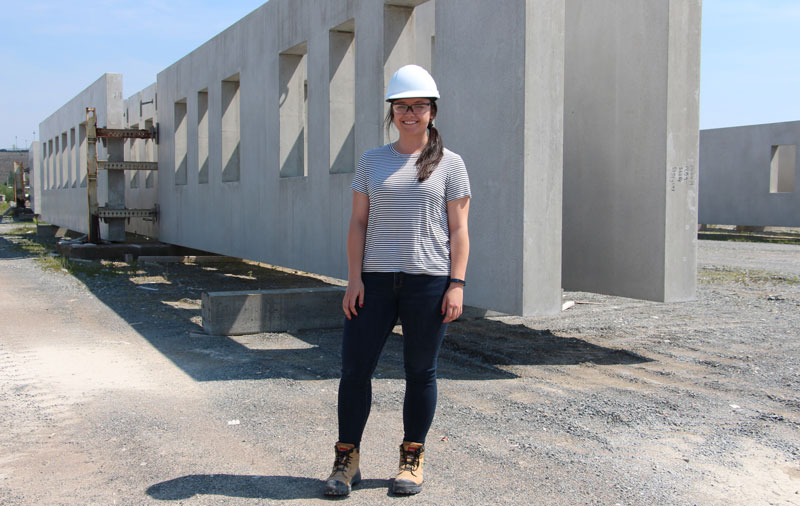4th Year Student Allison Boyd Gets a Concrete Experience with Co-Op
Author: Engineering Alumni Office
Posted on Aug 22, 2019
Category: Student Spotlight

When you get the chance to go into your final year of engineering with hands-on knowledge that makes your classes easier and without the stress of trying to find a job after graduation, life is good.
That’s the way Allison Boyd sees it.
Allison is entering her final year of civil engineering at UNB after having spent the last full year on a co-op term with Strescon in Saint John.
Strescon is part of the OSCO Construction Group, a collection of companies operating in concrete, steel and construction since 1955. Last year the company announced they would be investing $2 million in the University of New Brunswick to establish the Off-site Construction Research Centre and the OSCO Research Chair in Off-site Construction.
The New Brunswick company also hires engineering, business and computer science students to give them experiential learning opportunities and “test out” potential new full-time employees.
Allison says “the experience of learning from the ground up was amazing.”
In September 2018, she began her co-op work in the Strescon lab doing concrete and materials testing. “I learned this in school but I rarely had hands-on experience. I did tests every day and learned so much.”
Next she moved to quality control doing initial inspections on precast concrete forms – things like making sure that any rebar going into concrete would be correctly positioned. “I learned how to read complicated plans. I shadowed the quality control engineer and senior quality control inspector that I worked with and soon began overseeing quality control on my own.”
She then moved to quality control on final inspections, where she looked for any defects (including cracking, honeycombing, etc.) and wrote up quality control memos to management. “This was fun because I worked with design engineers to do repairs and remedials.”
Next up: taking on various roles in the shop, such as scheduler. “I learned that you really need to be meticulous when scheduling and ordering materials or everything gets behind on the whole project.” She said this was daunting to learn, but by the end she even wrote up a procedure manual for anyone coming after her in that position.
She also did a stint in the stores, where she ordered materials and coordinated with other teams on projects. “Communication is extremely important and I learned to get better at it.” She spent time in the yard as well, learning shipping and storing procedures.
Finally, Allison was promoted to Project Manager in the office, where she worked with other engineers overseeing whole projects from start to finish.
“I needed to talk with contractors and discuss details of the project, hold meetings to create plans and coordinate with everyone on the team. I really had to learn how to prioritize so that the project would run smoothly without delays.”
Allison says that joining the company was intimidating at first, but she quickly realized that this was the best way to learn. “Everyone was very welcoming and helpful, and I figured out not only how to apply the knowledge I was getting in class, but also how to deal with people, communicate well and coordinate projects. The experience was fantastic. I’ve even been invited to a site visit in the fall at the Bill Thorpe Walking Bridge in Fredericton because I was on the team working on new concrete deck slabs.”
She says that by the time she hit third year in her civil program, she still wasn’t sure what she would do with her degree. She had spent two summers working for New Brunswick’s Department of Transportation and Infrastructure, but wanted to try something different.
“I had taken a couple of concrete courses that interested me, but it was only theory. I wanted to see it physically, and when I did, I realized the importance of what I was designing. Now in my final year, I’ll be able to picture what we’re talking about because I know how it actually looks and works. I think I’ll get so much more out of my final year of classes because I have this experience.”
After graduation next Spring, Allison wants to continue doing structural work, and Strescon has already said they’d be happy to have her back as a full-time employee.
Although she admits that she was nervous about deferring graduation for a year in order to take a co-op position, she now firmly states that “taking this extra year in the program to do a co-op term was so worth it. I had an amazing year and now I know I’ll find a good job when I graduate.”
The Engineering Co-op office provides flexible programs where students can work up to six co-op terms (one co-op term is 4-months) as part of their degree. Students are engaged in highly productive work, rather than just observing, and are paid for their efforts (often with government assistance programs). The Co-op Office is accepting applications from large and small organizations around the globe for student co-op positions – and we’d love it if our alumni were involved in hiring our students. If you’d like to learn more please get in touch.
